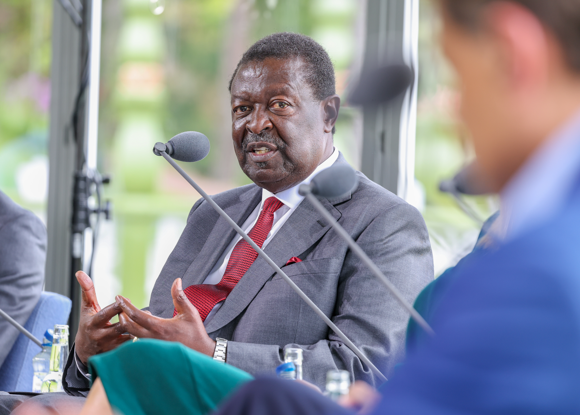
Prime Cabinet Secretary Musalia Mudavadi has said that Africa is not a passive recipient of aid or a battleground for influence but a continent at the threshold of intra-African trade and economic independence.
The CS said that at the heart of Africa’s journey is the principle of “African solutions to African problems,” a concept championed by the African Union (AU) and rooted in the belief that Africans are best positioned to address their challenges.
He said this principle is not a mere slogan but a call to action.
This, he said, is reflected in initiatives like African Union Support and Stabilisation Mission in Somalia (AUSSOM), which, since January 2025, has supported Somali forces in combating Al-Shabaab and transitioning security responsibilities.
"The AU’s peace missions, from AMISOM to AUSSOM, demonstrate Africa’s commitment to fostering stability, yet too often, the heavy lifting done by African troops and mediators is overshadowed by external actors claiming credit," he said.
Much as international support is valuable, he said it should amplify, not eclipse, African leadership.
Mudavadi said Africa is making efforts to drive its resilience against debilitating global shocks, and the narrative about Africa must shift from fragility to potential and from victim to a positive contributor to global governance.
He said the continent is playing a significant role in spheres like global climate action, including green energy and critical minerals needed for the global clean energy transition.
The Prime CS noted that strategic investments in youth, education, and technology also position Africa as a future global growth engine.
“Africa’s international partners must ask: Are all external engagements aligned with Africa’s development aspirations? Do they strengthen or undermine African institutions? And crucially, do they allow the continent to assert its agency and chart its course?” posed Mudavadi.
“Africa must dissuade itself from the hope that some other state or actor will come to develop the continent. We have to take ownership and chart our development path so that support from Africa’s partners can make meaningful transformations of our societies.”
He gave an example of the lessons of COVID-19 vaccine nationalism, including delays in essential medication supplies, growing indifference to humanitarian crises such as the Sudan case, signalling of drastic reduction in external aid for health, education, and other socio-economic must move Africans to a serious soul searching.
Mudavadi has affirmed that the time has come for a new partnership to be crafted based on mutual respect, where Africa is not seen as a geopolitical playground.
“There is an urgent need for the West to reframe its engagement with Africa by aligning economic cooperation, trade, and investment with the evolving priorities of developing nations,” Mudavadi said.
“The West must engage with Africa not through the lens of charity or risk management, but through strategic solidarity, fairness, and a shared commitment to global public goods. Africa seeks partnership rather than patronage or master-slave relations.”
The Prime Cabinet Secretary was speaking on Monday when he represented President William Ruto at the 13th Edition of the Kultaranta Talks in Naantali, Finland.
It is an annual high-level forum engaging with today’s shifting geopolitical landscape, global security and emerging foreign policy trends under the theme “The Changing World Order – Old Meets New.”
Mudavadi who participated in a panel discussion on “Accumulation of Shocks at the Global Level – What the West Should Understand,” that featured insightful contributions from Foreign Ministers Ms. Elina Valtonen (Finland), Arnoldo André Tinoco (Costa Rica), Olushegun Adjadi Bakari (Benin), and Vice Minister Russ Jalichandra (Thailand) emphasized on respect for African institutions tasked with resolving internal conflicts.
The session also included the Presidents of Finland (Alexander Stubb), Estonia (Alar Karis) and Republic of Latvia (Edgars Rinkevics) on the topical issue on Europe in the shockwaves and moderated by seasoned and renowned media personalities Fareed Zakaria of CNN and Francine Lacqua of Bloomberg.
Mudavadi stressed that unilateralism is undermining and weakening regional mechanisms actively working to secure lasting peace, particularly in the Horn of Africa and the Great Lakes region.
“We need to reassert the global rule of law. We cannot have a situation where we are seeing multilateralism on the retreat, taking a very heavy beating because of unilateral positions, where might is now beginning to be interpreted as being the correct thing, while it is not necessarily the correct thing. Internationally, we must work together to restore the respect for multilateralism because it is where more common solutions to the global challenges will be found,” Mudavadi said.
He further explained that Africa is finding it difficult to resolve its internal conflicts due to too much international involvement with some Western nations taking sides, thus prolonging the mediation processes and making the exercise costly.
Mudavadi said it is only through shared responsibility, due to democratic processes and wholistically adhering to a rules-based international landscape and desisting from any form of aggression where a nation seeks to destabilise another nation, that genuine multilateralism can be restored to foster a more stable and equitable world.
“Part of the challenge we face is the resources bound in the conflict-prone regions. When you talk of the new scramble for Africa, it is precisely that. Africa is beginning to face a lot of proxy battles for critical minerals and other resources that are being sought,” he said.












